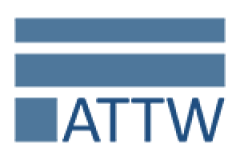Recent News and Awards
Since 2012, ATTW and Taylor & Francis/Routledge have collaborated on the ATTW Book Series in Technical and Professional Communication. We publish two lines of books. Contact Co-Editor Michele Simmons (simmonwm@miamioh.edu) or Co-Editor Ann Shivers-McNair (shiversmcnair@arizona.edu) with your idea for a book or for more information.
For Teachers and Readers
Sustainable Crowdfunding: Research-Based Analysis for Communication Campaigns
By Adam Pope
June 23, 2023
This book analyzes the communication and writing strategies necessary to craft and maintain ongoing crowdfunding campaigns to support businesses, nonprofits, artists, and others.
Drawing on theory from technical communication and user experience, as well as mixed methods research, and text mining, this book takes an evidence-based approach to understanding the successes and failures of crowdfunding campaigns. It examines campaigns across a range of platforms, including Kickstarter, GoFundMe, IndieGoGo, and Patreon. The book breaks down successful exemplar campaigns that have proven long-term success to show what has worked and why, giving readers a solid foundation to research and create a campaign of their own.
Sustainable Crowdfunding serves as a supplemental text for courses in technical and professional communication, user experience, communication research methods, and digital marketing, and will be of interest to both communication scholars and advanced crowdfunding professionals. Online interactive tools for qualitative and quantitative analysis are available at https://rhetoricaldata.com. A stop word appendix for the book can be accessed at www.routledge.com/9781032312736
Link to Routledge Press book page
Augmentation Technologies and Artificial Intelligence in Technical Communication: Designing Ethical Futures
By Ann Hill Duin, Isabel Pedersen
June 1, 2023
This book enables readers to interrogate the technical, rhetorical, theoretical, and socio-ethical challenges and opportunities involved in the development and adoption of augmentation technologies and artificial intelligence.
The core of our human experience and identity is forever affected by the rise of augmentation technologies that enhance human capability or productivity. These technologies can add cognitive, physical, sensory, and emotional enhancements to the body or environment. This book demonstrates the benefits, risks, and relevance of emerging augmentation technologies such as brain–computer interaction devices for cognitive enhancement; robots marketed to improve human social interaction; wearables that extend human senses, augment creative abilities, or overcome physical limitations; implantables that amplify intelligence or memory; and devices, AI generators, or algorithms for emotional augmentation. It allows scholars and professionals to understand the impact of these technologies, improve digital and AI literacy, and practice new methods for their design and adoption.
This book will be vital reading for students, scholars, and professionals in fields including technical communication, UX design, computer science, human factors, information technology, sociology of technology, and ethics. Artifacts and supplemental resources for research and teaching can be found at https://fabricofdigitallife.com and www.routledge.com/9781032263755.
Content Strategy: A How-to Guide
By Guiseppe Getto, Jack T. Labriola, Sheryl Ruszkiewicz
November 30, 2022
This comprehensive text provides a how-to guide for content strategy, enabling students and professionals to understand and master the skills needed to develop and manage technical content in a range of professional contexts.
The landscape of technical communication has been revolutionized by emerging technologies such as content management systems, open-source information architecture, and application programming interfaces that change the ways professionals create, edit, manage, and deliver content. This textbook helps students and professionals develop relevant skills for this changing marketplace. It takes readers through essential skills including audience analysis; content auditing; assembling content strategy plans; collaborating with other content developers; identifying appropriate channels of communication; and designing, delivering, and maintaining genres appropriate to those channels. It contains knowledge and best practices gleaned from decades of research and practice in content strategy and provides its audience with a thorough introductory text in this essential area.
Content Strategy works as a core or supplemental textbook for undergraduate and graduate classes, as well as certification courses, in content strategy, content management, and technical communication. It also provides an accessible introduction for professionals looking to develop their skills and knowledge.
Embodied Environmental Risk in Technical Communication: Problems and Solutions Toward Social Sustainability
By Edited By Samuel Stinson, Mary Le Rouge
March 04, 2022
This collection calls for improved technical communication for the public through an embodied, situated understanding of environmental risk that promotes social justice.
In addition to providing a series of chapters about recent issues on risk communication, this volume offers a diverse look at methodological practices for students, researchers, and practitioners looking to address embodied aspects of crisis and risk that incorporate UX, storytelling, and dynamic text. It includes chapters that bring embodiment to the forefront of risk communication, highlighting the cycle of content creation, dissemination, public response and decision making, continuing iterations of educational efforts, and recovery, toward increasing adaptive capacity as a whole. In addition, this work directs necessary attention to overcoming perceptual difficulties, memory lapses, definitional differences, access issues, and pedagogical problems in the communication of risks to diverse publics.
This collection is essential reading for scholars and can be used as a supplemental text or casebook for courses in technical communication, environmental communication, risk and crisis communication, science communication, and public health.
Link to Routledge Press book page
Design Thinking in Technical Communication: Solving Problems through Making and Collaboration
By Jason C. K. Tham
2021
This book explicates the relationships between design thinking, critical making, and socially responsive technical communication. It leverages the recent technology-powered DIY culture called “the Maker Movement” to identify how citizen innovation can inform cutting-edge social innovation that advocates for equitable change and progress on today’s “wicked” problems.
After offering a succinct account of the origin and recent history of design thinking, along with its connections to the design paradigm in writing studies, the book analyzes maker culture and its influences on innovation and education through an ethnographic study of three academic makerspaces. It offers opportunities to cultivate a sense of critical changemaking in technical communication students and practitioners, showcasing examples of socially responsive innovation and expert interviews that urge a disciplinary attention to social justice advocacy and an embrace of the design-thinking principle of radical collaboration. The value of design thinking methodologies for teaching and practicing socially responsible technical communication are demonstrated as the author argues for a future in the field that sees its constituents as leaders in radical innovation to solve wicked social problems.
This book is essential reading for instructors, students, and practitioners of technical communication, and can be used as a supplemental text for graduate and undergraduate courses in usability and user-centered design and research.
The Profession and Practice of Technical Communication
July 30, 2021
This practical text offers a research-based account of the technical communication profession and its practice, outlining emergent touchpoints of this fast-changing field while highlighting its diversity.
Through research on the history and the globalization of technical communication and up-to-date industry analysis, including first-hand narratives from industry practitioners, this book brings together common threads through the industry, suggests future trends, and points toward strategic routes for development. Vignettes from the workplace and examples of industry practice provide tangible insights into the different paths and realities of the field, furnishing readers with a range of entry routes and potential career sectors, workplace communities, daily activities, and futures. This approach is central to helping readers understand the diverse competencies of technical communicators in the modern, globalized economy.
The Profession and Practice of Technical Communication provides essential guidance for students, early professionals, and lateral entrants to the profession and can be used as a textbook for technical communication courses.
Sustainable Crowdfunding: Research-Based Analysis for Communication Campaigns
By Adam Pope
June 23, 2023

This book analyzes the communication and writing strategies necessary to craft and maintain ongoing crowdfunding campaigns to support businesses, nonprofits, artists, and others.
Drawing on theory from technical communication and user experience, as well as mixed methods research, and text mining, this book takes an evidence-based approach to understanding the successes and failures of crowdfunding campaigns. It examines campaigns across a range of platforms, including Kickstarter, GoFundMe, IndieGoGo, and Patreon. The book breaks down successful exemplar campaigns that have proven long-term success to show what has worked and why, giving readers a solid foundation to research and create a campaign of their own.
Sustainable Crowdfunding serves as a supplemental text for courses in technical and professional communication, user experience, communication research methods, and digital marketing, and will be of interest to both communication scholars and advanced crowdfunding professionals. Online interactive tools for qualitative and quantitative analysis are available at https://rhetoricaldata.com. A stop word appendix for the book can be accessed at www.routledge.com/9781032312736
Link to Routledge Press book page
Augmentation Technologies and Artificial Intelligence in Technical Communication: Designing Ethical Futures
By Ann Hill Duin, Isabel Pedersen
June 1, 2023
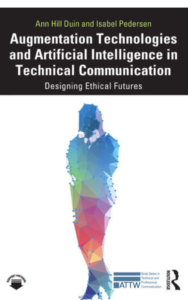
This book enables readers to interrogate the technical, rhetorical, theoretical, and socio-ethical challenges and opportunities involved in the development and adoption of augmentation technologies and artificial intelligence.
The core of our human experience and identity is forever affected by the rise of augmentation technologies that enhance human capability or productivity. These technologies can add cognitive, physical, sensory, and emotional enhancements to the body or environment. This book demonstrates the benefits, risks, and relevance of emerging augmentation technologies such as brain–computer interaction devices for cognitive enhancement; robots marketed to improve human social interaction; wearables that extend human senses, augment creative abilities, or overcome physical limitations; implantables that amplify intelligence or memory; and devices, AI generators, or algorithms for emotional augmentation. It allows scholars and professionals to understand the impact of these technologies, improve digital and AI literacy, and practice new methods for their design and adoption.
This book will be vital reading for students, scholars, and professionals in fields including technical communication, UX design, computer science, human factors, information technology, sociology of technology, and ethics. Artifacts and supplemental resources for research and teaching can be found at https://fabricofdigitallife.com and www.routledge.com/9781032263755.
Content Strategy: A How-to Guide
By Guiseppe Getto, Jack T. Labriola, Sheryl Ruszkiewicz
November 30, 2022
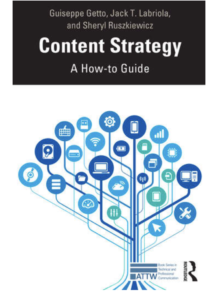
This comprehensive text provides a how-to guide for content strategy, enabling students and professionals to understand and master the skills needed to develop and manage technical content in a range of professional contexts.
The landscape of technical communication has been revolutionized by emerging technologies such as content management systems, open-source information architecture, and application programming interfaces that change the ways professionals create, edit, manage, and deliver content. This textbook helps students and professionals develop relevant skills for this changing marketplace. It takes readers through essential skills including audience analysis; content auditing; assembling content strategy plans; collaborating with other content developers; identifying appropriate channels of communication; and designing, delivering, and maintaining genres appropriate to those channels. It contains knowledge and best practices gleaned from decades of research and practice in content strategy and provides its audience with a thorough introductory text in this essential area.
Content Strategy works as a core or supplemental textbook for undergraduate and graduate classes, as well as certification courses, in content strategy, content management, and technical communication. It also provides an accessible introduction for professionals looking to develop their skills and knowledge.
Link to Routledge Press book page
Embodied Environmental Risk in Technical Communication: Problems and Solutions Toward Social Sustainability
By Edited By Samuel Stinson, Mary Le Rouge
March 04, 2022
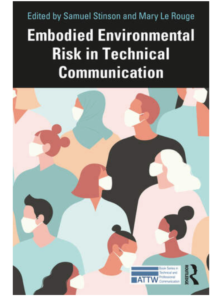
This collection calls for improved technical communication for the public through an embodied, situated understanding of environmental risk that promotes social justice.
In addition to providing a series of chapters about recent issues on risk communication, this volume offers a diverse look at methodological practices for students, researchers, and practitioners looking to address embodied aspects of crisis and risk that incorporate UX, storytelling, and dynamic text. It includes chapters that bring embodiment to the forefront of risk communication, highlighting the cycle of content creation, dissemination, public response and decision making, continuing iterations of educational efforts, and recovery, toward increasing adaptive capacity as a whole. In addition, this work directs necessary attention to overcoming perceptual difficulties, memory lapses, definitional differences, access issues, and pedagogical problems in the communication of risks to diverse publics.
This collection is essential reading for scholars and can be used as a supplemental text or casebook for courses in technical communication, environmental communication, risk and crisis communication, science communication, and public health.
Link to Routledge Press book page
Design Thinking in Technical Communication: Solving Problems through Making and Collaboration
By Jason C. K. Tham
2021
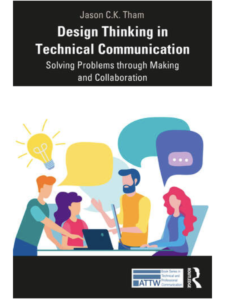
This book explicates the relationships between design thinking, critical making, and socially responsive technical communication. It leverages the recent technology-powered DIY culture called “the Maker Movement” to identify how citizen innovation can inform cutting-edge social innovation that advocates for equitable change and progress on today’s “wicked” problems.
After offering a succinct account of the origin and recent history of design thinking, along with its connections to the design paradigm in writing studies, the book analyzes maker culture and its influences on innovation and education through an ethnographic study of three academic makerspaces. It offers opportunities to cultivate a sense of critical changemaking in technical communication students and practitioners, showcasing examples of socially responsive innovation and expert interviews that urge a disciplinary attention to social justice advocacy and an embrace of the design-thinking principle of radical collaboration. The value of design thinking methodologies for teaching and practicing socially responsible technical communication are demonstrated as the author argues for a future in the field that sees its constituents as leaders in radical innovation to solve wicked social problems.
This book is essential reading for instructors, students, and practitioners of technical communication, and can be used as a supplemental text for graduate and undergraduate courses in usability and user-centered design and research.
The Profession and Practice of Technical Communication
By Yvonne Cleary
July 30, 2021
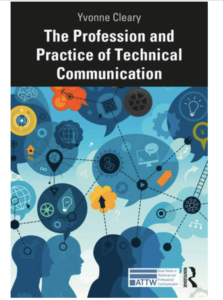
This practical text offers a research-based account of the technical communication profession and its practice, outlining emergent touchpoints of this fast-changing field while highlighting its diversity.
Through research on the history and the globalization of technical communication and up-to-date industry analysis, including first-hand narratives from industry practitioners, this book brings together common threads through the industry, suggests future trends, and points toward strategic routes for development. Vignettes from the workplace and examples of industry practice provide tangible insights into the different paths and realities of the field, furnishing readers with a range of entry routes and potential career sectors, workplace communities, daily activities, and futures. This approach is central to helping readers understand the diverse competencies of technical communicators in the modern, globalized economy.
The Profession and Practice of Technical Communication provides essential guidance for students, early professionals, and lateral entrants to the profession and can be used as a textbook for technical communication courses.
Link to Routledge Press book page

Teaching Content Management in Technical and Professional Communication
Edited by Tracy Bridgeford: February, 2020
This collection offers a comprehensive overview of approaches to teaching the complex subject of content management. The book is an essential resource for both instructors new to teaching technical and professional communication, and experienced instructors who are interested in upgrading their pedagogies to include content management. Read more or buy this book on Routledge.

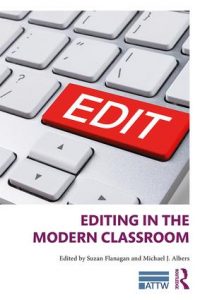
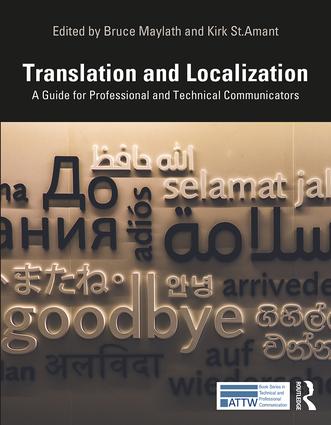
Translation and Localization
Edited by Bruce Maylath and Kirk St. Amant: June, 2019
Detailed yet accessible, Translation and Localization brings together the research and insights of veteran practicing translators to offer comprehensive guidance for technical communicators. This book will be of interest to students of ethnic conflict, Asian politics, and security studies. Read more or buy this book on Routledge.

Technical Communication After the Social Justice Turn
By Rebecca Walton, Kristin Moore, and Natasha Jones: May, 2019
Technical Communication After the Social Justice Turn moves readers from conceptual explorations of oppression and justice to a theoretical framework that allows for the concepts to be applied and implemented in a variety of practical contexts. Read more or buy this book on Routledge.
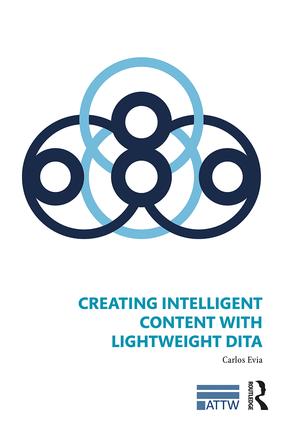
Creating Intelligent Content with Lightweight DITA
By Carlos Evia: December, 2018
Creating Intelligent Content with Lightweight DITA documents the evolution of the Darwin Information Typing Architecture (DITA) – a widely used open standard for structuring technical content. This book is intended for practitioners and students interested in structured authoring or the DITA standard. Read more or buy this book on Routledge.
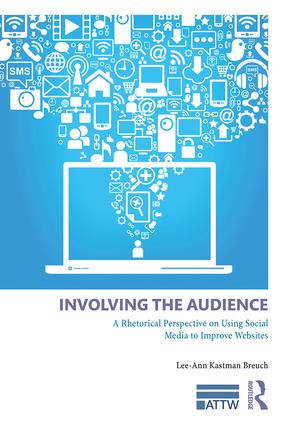
Involving the Audience
By Lee-Ann Kastman Breuch: September, 2018
Involving the Audience examines the usability challenges raised by large complex websites and proposes ways the social web can expand usability research to address these new challenges. Breuch explains how large complex websites are inherently challenged by open-ended, interactive tasks that often have multiple pathways to completion. Read more or buy this book on Routledge.
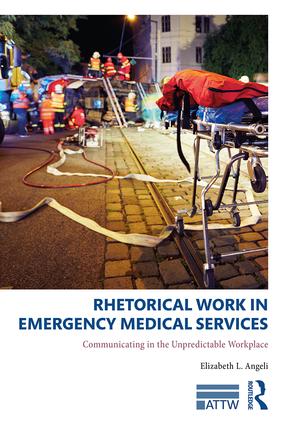
Rhetorical Work in Emergency Services
Winner of the 2020 CCCC Technical and Scientific Communication Award in the category of Best Book in Technical or Scientific Communication
By Elizabeth L. Angeli: August, 2018
Grounded in a 16-month study in the EMS workplace, Rhetorical Work in Emergency Medical Services contributes to our theoretical, methodological, and practical understandings of the situation-specific processes that communicators and researchers engage in to respond to the urgencies and constraints of high-stakes workplaces. Read more or buy this book on Routledge.


Communicating Project Management
By Benjamin Lauren: March, 2018
Communicating Project Management argues that the communication practices of project managers have necessarily become participatory, made up of complex strategies grounded in rhetorical concepts. It draws on case studies across to investigate how project management relies on communication as teams develop products, services, and internal processes. Read more or buy this book on Routledge.
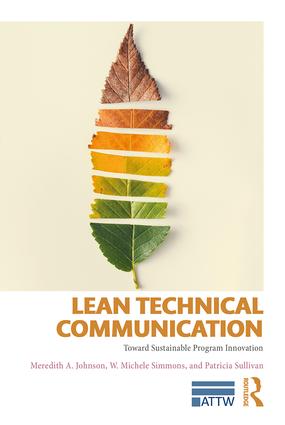
Lean Technical Communication
Winner of the 2020 CCCC Research Impact Award
By Meredith A. Johnson, W. Michele Simmons, and Patricia Sullivan: November, 2017
Lean Technical Communication offers a theoretically and empirically-grounded model for stewarding professional and technical communication programs under diverse conditions. Its insights benefit those involved in the development of undergraduate and graduate programs, including majors, service courses, minors, specializations, and certificates. Read more or buy this book on Routledge.
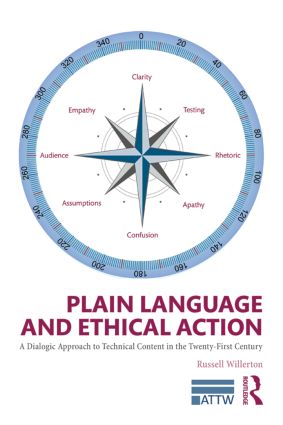
Plain Language and Ethical Action
By Russell Willerton: June, 2015
Plain Language and Ethical Action examines principles and practices of plain language that technical content producers can apply to meet their audiences’ needs in an ethical way. This work is intended for use in courses in information design, technical and professional communication, health communication, and other areas producing plain language communication. Read more or buy this book on Routledge.
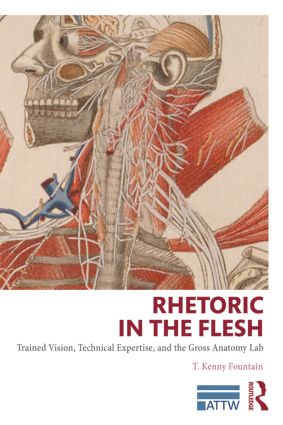
Rhetoric in the Flesh
By T. Kenny Fountain: May, 2014
Rhetoric in the Flesh is the first book-length ethnographic study of the gross anatomy lab to explain how rhetorical discourses, multimodal displays, and embodied practices facilitate learning and technical expertise and how they shape participants’ perceptions of the human body. This book will be valuable for graduate and advanced undergraduate courses in technical and professional communication and rhetorical studies. Read more or buy this book on Routledge.
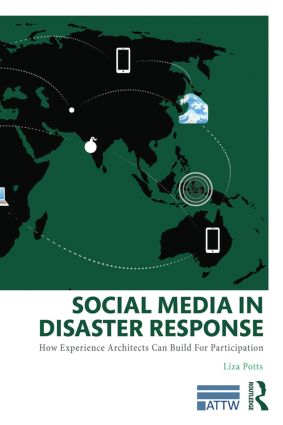
Social Media in Disaster Response
By Liza Potts: October, 2013
Social Media in Disaster Response focuses on how emerging social web tools provide researchers and practitioners with new opportunities to address disaster communication and information design for participatory cultures. This book provides researchers with tools for analyzing these communication systems while providing practitioners with design methods to assist them in influencing the structure of these communication systems. Read more or buy this book on Routledge.
For Book Review Copies
The Research Line:
This line focuses on scholarly monographs (e.g., those originating from scholars’ dissertation research) and edited collections. Books that exemplify the kind of monographs we develop include Sauer’s The Rhetoric of Risk, Grabill’s Writing Community Change, Spinuzzi’s Tracing Genre through Organizations, and Winsor’s Writing Power.
As an author of a monograph, you should discuss the practical implications of your research either throughout your text (interspersed among chapters) or, at least, in a chapter devoted to implications. In other words, you need to show how people working in industry or in academia can put your research to use.
Some collections that exemplify those that we are developing include Albers and Still’s Usability of Complex Information Systems: Evaluation of User Interaction, Scott and Longo’s Critical Power Tools: Technical Communication and Cultural Studies, and Spilka’s Digital Literacy for Technical Communication.
As an editor of a collection, you should help your chapter authors think about and develop the implications of their research. In addition, you should comment on the implications of the collected chapters in your introduction and conclusion chapters.
The Practice Line:
This line focuses on texts for industry as well as classroom teaching and learning. Books that exemplify the kinds of guides to practice that we are developing include Barnum’s Usability Testing Essentials, Hackos’s Information Development, and Yunker’s Beyond Borders: Web Globalization Strategies. We are also interested in developing useful guides such as Kohl’s The Global English Style Guide.
As an author of a practice-line text, you should ensure that you support with evidence the advice, guidelines, and instruction that you offer to your readers. In other words, we are interested in texts that help people learn how to master concepts and skills but that ground the instruction in research findings—particularly findings from empirical (qualitative or quantitative) research.
Potential Book Topics and Methods
We are interested in publishing interesting and useful work in a wide range of topics related to technical and professional communication (TPC), including but not limited to the following: assessment of TPC programs, content management systems, globalization of TPC, human-computer interaction, intercultural communication, health-care and medical communication, pedagogy of TPC, publication management, risk and crisis communication, service learning in TPC, technical and professional editing, translation of TPC, usability/user-experience and accessibility studies, visual communication, and web design and development. We are particularly interested in developing practice-line texts about accessibility and publication management.
We are interested in work that employs a variety of qualitative and quantitative research methods, including but not limited to corpus linguistics, ethnography, experimental methods (e.g., eye tracking), genre analysis, linguistic (e.g., discourse and conversation) analysis, rhetorical analysis, and usability testing. And, particularly relevant to practice-line texts, we welcome a variety of pedagogical methods.
Contact the Series Editor
You do not need to have a complete proposal package ready before you talk to the editors about your proposal. In fact, talking about your idea early in the development process is the best thing to do. Contact the series editors to set up a day and time to discuss. See the ATTW book series submission guidelines for developing your proposal.
Link to Routledge Press book page
The Editorial Advisory Board
- Tim Amidon, Colorado State University
- Ann Blakeslee, Eastern Michigan University
- Lee-Ann Breuch, University of Minnesota
- Huiling Ding, North Carolina State University
- Michelle Eble, East Carolina University
- Avery Edenfield, Utah State University
- Jeff Grabill, University of Leeds
- Kimberly Harper, North Carolina Agricultural and Technical State University
- Bill Hart-Davidson, Michigan State University
- Donnie Johnson-Sackey, University of Texas, Austin
- Natasha Jones, Michigan State University
- Halcyon Lawrence, Towson University
- Kristen Moore., University of Buffalo
- Marie Paretti, Virginia Polytechnic and State University
- Emma Rose, University of Washington, Tacoma
- Jennifer Sano-Franchinni, West Virginia University
- Clay Spinuzzi, University of Texas, Austin
- Rebecca Walton, Utah State University
- Miriam Williams, Texas State University
- Han Yu, Kansas State University
The Template for Your Proposal Package
A proposal package of about 13,000 words (not including curriculum vitae) is the first step in developing a project for the ATTW Book Series in Technical and Professional Communication. In preparing your proposal package, please keep in mind that the series editor and the publisher (Taylor & Francis/Routledge) need to know as much as possible about your planned book, including its scope, its intended audience, organizational structure, and the ways in which the publisher can best promote the volume to the intended readers.
The proposal will serve to make the case that you can write with authority, accuracy, and clarity, and that you can present what you have to say in a way that will be of interest and of relevance to your intended readers, and that what you have to say is appropriate for the series. With this in mind, your proposal should include four items:
A. A prospectus describing your intentions (about 5,000 words)
B. A detailed table of contents (about 1,000 words)
C. A sample chapter (about 7,000 words)
D. An up-to-date curriculum vitae (CV)
Your proposal package should provide the series editor, reviewers, and the publisher with sufficient evidence to make a publishing decision about the project. Please see the publication manual for more information about developing a proposal package.
